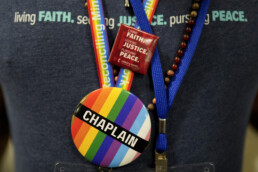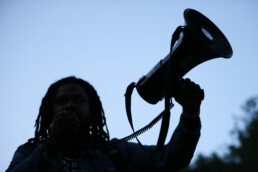"They Don't Look at Us as Human Beings"
Lead plaintiff Amanda Zurawski on the Texas Supreme Court’s decision to uphold a ban that almost killed her—and why she’s planning to run for office herself
BY CINDI LEIVE
We’ve grown accustomed to courts acting coldly, but last Friday’s Texas Supreme Court decision seemed especially and brutally devoid of compassion. In Zurawski v. State of Texas, the court had heard from 20 women who had been denied abortion care when experiencing pregnancy complications—women who had hemorrhaged, been forced to carry babies without skulls, and nearly died. And yet, the justices still ruled not to change or amend Texas’s abortion ban, which has forced doctors to deny patients vital medical care out of fear of prosecution. (What this says about the state’s regard for the vastly greater number of people who need abortions for less “medically necessary” reasons—such as, you know, not wanting to be pregnant anymore—is a story for another time.)
Over the weekend, I called Amanda Zurawski, the woman who lent her name—and the last year and a half of her life—to the lawsuit. I first met Amanda in the fall of 2022 when a doctor whispered to one of my Meteor colleagues that there was a woman in Austin who’d been through hell and might be willing to share her story. She did, detailing her harrowing experience for the world, but then went on to do much more, testifying before Congress, speaking up for other patients—and taking on her own state’s government.
Cindi Leive: This decision felt like a punch in the face to so many women—but for those of you who testified, and your families, it was so personal. What measure of justice were you and [your husband] Josh expecting? How much was this a surprise to you?
Amanda Zurawski: It wasn't a huge surprise because we know that the Texas Supreme Court is full of conservative Republicans—[all] nine of [the justices] are conservative Republicans. And then, after the ruling in the Kate Cox case [in which the court denied the December 2023 abortion request of a Texas woman whose fetus had no chance of survival], that was a signal of how our case was going to go. So we had time to prepare for a loss.
What we weren't expecting, and what we were really surprised by, was the way that they wrote the decision—that they literally wrote out most of the plaintiffs by not even using their name. [Only three patients and two doctors were referred to by name in the ruling.] And that felt unnecessarily cruel and offensive…To me, it means they don't care about us and they don't look at us as human beings. They don't care about our trauma, our grief, our loss. They don't want to acknowledge us. Because as long as they can ignore us and pretend like we don't exist—just like my Senators [Ted Cruz and John Cornyn] did when I testified in front of Congress—they can pretend like the problem isn't real.
We did a press call right after the ruling came out, and there were 11 plaintiffs that could join. And seeing their faces and hearing their voices and how heartbroken they were—that was really gutting.

You said that that was the hardest part for you. Why?
I want to acknowledge my name was used in the Supreme Court's decision. They did acknowledge what happened to me personally, and they didn't for anyone else. And that feels very unfair and very unjust. And I also feel a little bit like…people were counting on me, I think, because I was the first one to file, because it was my name on the suit…I do feel a little bit like people were depending on me, and I feel a little bit like I let them down.
You said on Friday, “We will continue to fight.” Tell me how.
Well, I don't think our lawsuit can do much more. People keep asking me if it's going to go to the U.S. Supreme Court, and I want to make it very clear that…likely, this is the end. But we can keep fighting in other ways. Personally, I will continue to campaign to get people to vote for pro-choice candidates. We can continue to share our own stories and to share other people's stories. We can donate our time and our money to abortion providers and organizations.
And did you say that some of the Texas Supreme Court justices are up for reelection?
Yes! There are three up for reelection [Jimmy Blacklock, John Devine, and Jane Bland]. I think we know now very clearly how they feel about…a woman's right to choose, so I'm really hoping that we can get the word out before November and not get them reelected. It feels really good to be able to say that so clearly, because for a year and a half I couldn't, because we had an ongoing lawsuit. [Now] I'm like, let's light some fires.
I’ve been thinking about what’s happened in Texas since you first filed your lawsuit. You were the first [plaintiff], and then there were five women, and then 20. And I don't know if you saw this thread, but just two weeks ago, Ryan Hamilton, a musician and DJ, tweeted that his wife, who had been pregnant with their second child, was denied abortion care in a very similar situation to yours. Despite the baby no longer having a heartbeat, she was repeatedly sent home. She lost so much blood that he found her unconscious on the bathroom floor. She almost died. This happened in Texas two weeks ago. How does it feel knowing that while the Supreme Court is making this decision, claiming that doctors are able to do the right thing [under existing Texas law], the number of women who have been exactly where you were continues to climb?
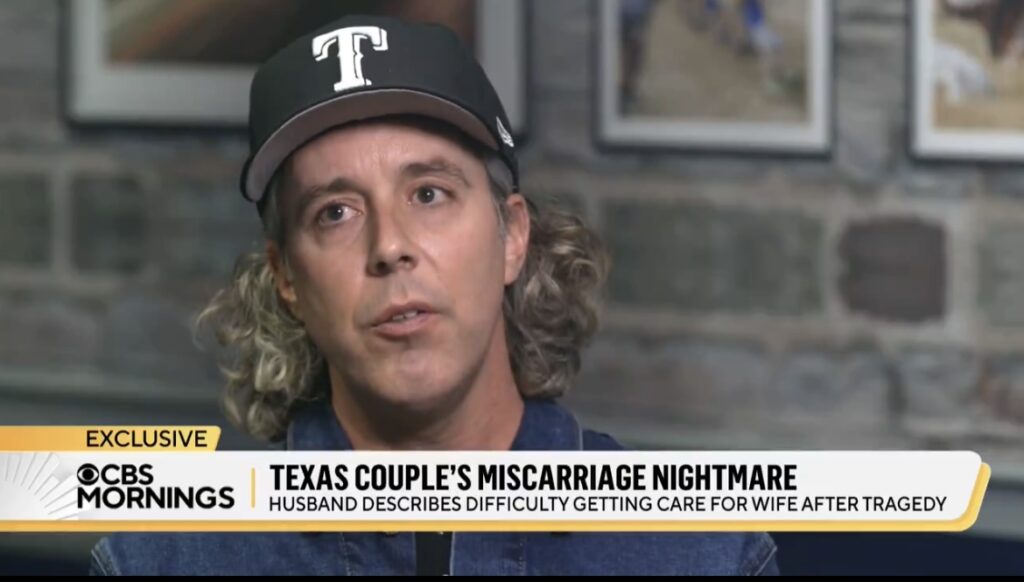
That story makes me sick to my stomach. And it's going to keep happening, because lawmakers aren't doing anything to fix it. It's infuriating that the Supreme Court of Texas had the opportunity to fix this—had the opportunity to make things better—and they did nothing. And when the Supreme Court says, “Doctors can practice medicine, this isn't a problem, the law is clear”—clearly that's not the case! Listen to our stories. Listen to what's happening to us. Listen to doctors. They refuse to hear us, and I don't know what it's going to take for them to wake up and realize that people are dying because of this. Or if they haven't yet, they're going to.
There's an enormous amount of suffering happening in Texas and similar states, and they need to fix it.
Three months ago, when the Alabama Supreme Court was deeming embryos people, you said that you worried that Texas was going to do the same, and that you were going to move your embryos out of state. The irony is incredible: You need IVF because the state's laws impacted your fertility, and now the state is making that path to having a family more difficult. How has that process felt?
It was pretty upsetting, because moving embryos is, as you can imagine, incredibly complicated. It is very expensive. And from my understanding, things don't go wrong very often, but if they do, it's catastrophic—you lose your embryos. As we [were] going through it, I'm like, this is terrifying, because I feel like we're on a ticking clock, because Texas [could] make this decision [to criminalize IVF] any day. By the way, there now is a case about embryonic personhood that the Texas Supreme Court is deciding whether or not to hear…[and] depending on how they rule, it could do the exact same thing that happened in Alabama and threaten IVF access. Fortunately, our [embryos] are now safe, but if Trump is reelected, we're scared that it won't matter where your embryos are, because he'll institute national bans or laws that are going to affect their safety. It's just a really troubling, scary time right now to be trying to plan a family.
Last question—what gives you hope right now? Is there anything?
You know, in our press call, my fellow plaintiff, Dr. Austin Dennard, said that she likes to think that people are good. And I agree with her. I think that most people at their core want to do the right thing. And when we're speaking out about what happened to us, we do see a lot of goodness in most people. And I see the people who are fighting in their communities. I see people who are running for office because they're trying to protect women. And I think there's a lot to be hopeful about. I do think we're going to fix this. It's going to take a lot of work, but we can do it.
You mentioned women running for office. I can't get off the phone without asking you the same question that America Ferrera asked you onstage at our event a year and a half ago. Any further thoughts about you running for office?
Oh, yeah… That is probably going to happen. I've started trying to figure out what office might be a good fit for me. I’ve talked to a lot of different organizations; I’ve talked to a lot of different individuals. I think the next step would be fundraising. But Zurawski ‘26 is probably something you’ll see.
Zurawski 2026. Amazing. We’ll leave it there.
The plaintiffs in the case are: Patients Amanda Zurawski, Lauren Miller, Lauren Hall, Anna Zargarian, Ashley Brandt, Kylie Beaton, Jessica Bernardo, Samantha Casiano, Austin Dennard, D.O., Taylor Edwards, Kiersten Hogan, Lauren Van Vleet, Elizabeth Weller, Kristen Anaya, Kaitlyn Kash, D. Aylen, Kimberly Manzano, Danielle Mathisen, M.D., Cristina Nuñez, and Amy Coronado; and health care providers Damla Karsan, M.D. and Judy Levison, M.D., M.P.H. Read their stories on Center for Reproductive Rights' site.
The Threat of Ozempic "Coercion"
The drugs are everywhere. Oprah takes them; I’ve taken them. But activist Virgie Tovar says that in a fatphobic culture, there’s no such thing as a truly free choice.
By Samhita Mukhopadhyay
Over the last few years, weight-loss drugs—a category that includes semaglutides like Ozempic and Wegovy and the tirzepatide Mounjaro—have surged in popularity; so have conversations about them. Oprah, who is taking a semaglutide, just hosted a special on her evolving feelings about weight loss; body-positive influencers who have decided to go on these drugs are being asked why. I have written about my own experiences both taking and later coming off Mounjaro, including my concerns about what taking a “diet drug” might mean for my longtime commitment to size inclusivity.
I wasn't sure there were many more new thoughts around this issue. But a recent conversation with Virgie Tovar, the longtime fat activist and the author of You Have the Right to Remain Fat, made me think differently. Tovar has been vocal about her feelings about Ozempic and what it means for the lived reality of fat people. I asked her to talk to me about it all.
Samhita Mukhopadhyay: I’ve been dying to have this conversation with you, Virgie. You’ve written about fat politics and done groundbreaking work in the fat inclusion space for decades. What are your thoughts on Ozempic?
Virgie Tovar: The question for me is: What does going on Ozempic look like in a culture where there's so much fatphobia? I've always wanted women to be able to choose whatever is going to help them thrive within the culture we live in. For me, it's been fat activism; it's been being anti-diet, it's been being fat. These are the things that have helped me thrive. I've never been happier, I've never been more connected, and I've never felt more successful. I want a world in which people can choose to do whatever is going to help them [while] understanding that there is no truly full autonomy to choose. I think about the arguments that feminists were having in the eighties around what consent even means in a culture [of] misogyny. That question haunts our culture in all these different ways.
How do you address the question that everyone brings up when anyone talks about fat acceptance: “What about your health?” Oprah just did another special on weight loss—this time, taking on diet culture. And it wasn’t terrible! But she still said that “obesity is a disease.” What do you think about that?

One of the things that's really important to understand is that the American Medical Association’s decision to classify obesity as a disease [in 2013] was a political decision. It wasn't a data-driven decision. There was a committee that was assigned to do a literature review and to make a call based on the review—and their call was [obesity] does not qualify as a disease. [The AMA moved forward with the decision despite the committee’s recommendation.] This is one of those itty-bitty moments in medical history that gets completely buried. The only headline was obesity disease, obesity disease.
The AMA decision, inadvertently or not, created a pathway for physicians to step in and become the face and the leadership of diet culture. And now we're looking at prescriptions. Now we're looking at medication; now we're looking at pathology. We're not [just] talking about beauty and whether or not you can wear a bikini in summer; we're talking about diabetes. Which is [a significant] shift because an unregulated non-physician-run diet industry doesn't get the [same] traction that a lab-coat-wearing person talking about illness [does].
What I find so fascinating about this whole conversation is that fatphobia and weight-loss preoccupation are so central they create a reality in which all outcomes end [with weight loss]. And there's another universe in which when people have a health concern, instead they think, Why don't we have universal healthcare? There's a world in which we look outward, and we demand—with the same fervor that we're searching for Ozempic—that we change the policy and that every single person has universal healthcare. There’s a world in which when people start to have [health issues], they think, why are we working so hard? But that’s not what we do.
What amazes me is there are a million potential health interventions available to human beings, but no one sees any of those. [Weight loss] is the only solution we're comfortable with.

And what is your response to people who reiterate the research about obesity and life expectancy?
The culture is obsessed with one piece of data, which is that fat people live shorter and less healthy lives than thin people. And what's scary to me is that one piece of data gives pharmaceutical companies and doctors this cavalier attitude. It creates an extremely terrifying, morally hazardous reality in which whatever happens to us [as we try to lose weight] is just collateral damage; it's all learnings on the way to the solution [of weight loss] that they truly believe is just around the corner. When weight science is very clear that it's not. Unless we're talking about literally genetically altering zygotes, unless we're talking about eugenics, there isn't a reality in which there aren't going to be bigger people and smaller people.
There is no single data point that tells an entire story. When you look at the multiple data points [around weight and health], they tell you a [more] clear story. So, the first additional data point I want to bring up is that all marginalized groups live shorter or worse lives than people who are in a dominant group. Black Americans still live shorter lives than white Americans, and people in the LGBTQ community have worse health outcomes than people in the straight community. So, right now, weight discrimination is legal federally. When we accept what minority stress theory teaches us—which is that all marginalized groups have worse health outcomes—that starts to fill out the story.
We have this idea that without diet culture, Americans would just eat nonstop and become bigger and bigger—but that’s a lack of understanding of basic data: Dieting makes us binge-eat and increases our weight over time.
[With other issues], we don't use the framework of “We have to change that person” in order to fix it. We understand that there are societal problems that need to be solved in order for people to have a better quality of life and longer life expectancy. It is only our fat phobia that disallows us from using the frame that we use to understand every other civil rights issue.
Then the second data point is that even though our culture thinks that weight loss is awesome and healthy, weight science is very, very, very clear—the body and the nervous system may experience weight loss as extremely distressing. The third data point is that we know that people who are in larger bodies who don't have high internalized fatphobia have [better] health outcomes [than] people in the same larger bodies who do. They don't have the same [reduced] longevity outcomes as people who do internalize fat phobia.

So, what do weight-loss drugs mean in the context of all this?
We try to create environments of neutrality where people can make the right decision around serious medications but that is not the environment we are in [around weight loss]. I've been using the word coercive to describe it.
Can you expand on what you mean by “coercive”?
Number one: we live in a culture that hates fat people. I think that's changing, but people really still believe that the worst thing you could be is fat. So imagine making a decision about whether or not you're going to take a medication that has pretty intense side effects, and that is very costly in the context of If you take this, you will [no longer] be part of a group of people who are reviled or discriminated against.
I can imagine it.
Now that we're understanding it's wrong to promote weight stigma, the thing that feels like it's in the air—that continues to be the dog whistle—is like, But health! You can convince yourself that nobody should be pressured to look a certain way. And that's easy to get behind because we all kind of know that's wrong. But what they're doing is this brilliant rhetorical pivot. How could you argue health?
When the path to that “health” (i.e., diet culture) is not always very…healthy.
Yeah. The other part of the story that people have a hard time understanding is a lot of the health outcomes that higher-weight people have are also correlated with chronic dieting and chronic food restriction. We have this phenomenon where [after dieting] your body is now armed and ready for when you do this again. And the way that it's doing that is by increasing your baseline weight. We have this idea that without diet culture, Americans would just eat nonstop and become bigger and bigger—but that's a lack of understanding of basic data: Dieting makes us binge-eat and increases our weight over time.
There’s also been a pretty robust conversation about body-positive influencers taking these drugs. It was reported in The Washington Post that one of these drug companies had reached out to you to see if you’d be interested in going on a GLP-1. Why do you think they are going after influencers?
Plus-size women [authoring] their own stories changed the culture; people didn't know that they could opt out of dieting until body positivity came around. And now that the genie’s out of the bottle, it would take an incredible reversal—which I think, frankly, some of these pharmaceutical companies are trying to do. They see it, right? Why in the world are you targeting body-positive influencers if we're not a threat?
So, after reading everything I've written about my own journey about going on and off Mounjaro, and especially making the decision to take the drug after my father died from diabetes-related complications—what advice would you have given me throughout this?
The very first thing I would've told you is grieve. Don't let the note that stays in your mouth about the passing of your father be that of phobia.
And then I would say, let's talk about what being on this medication might look like, and let’s allow time to process—read, read it again, have questions about it. I guess for me, for people making decisions, the timeline would be longer. I think there would be serious conversations about what's really at stake here. And I think in my ideal world, I'm saying to this person, you have the right to take this medication. No one can take that away from you. But don't let fatphobia be the thing that pushes you from a no to a yes.
 Samhita Mukhopadhyay is the Editorial Director of The Meteor. She is the author of the forthcoming book, The Myth of Making It. She is the former Executive Editor of Teen Vogue and is the co-editor of Nasty Women: Feminism, Resistance and Revolution in Trump's America and the author of Outdated: Why Dating is Ruining Your Love Life.
Samhita Mukhopadhyay is the Editorial Director of The Meteor. She is the author of the forthcoming book, The Myth of Making It. She is the former Executive Editor of Teen Vogue and is the co-editor of Nasty Women: Feminism, Resistance and Revolution in Trump's America and the author of Outdated: Why Dating is Ruining Your Love Life.
Everyone is Having Fun Talking About Drake and Kendrick Lamar
A long-time music critic tackles a darker truth at the core of their beef: the expendability of women’s trauma
By Julianne Escobedo Shepherd
Kendrick Lamar and Drake have spent the better part of the past month in a rap beef, which you might already know if you spend time on social media, where they've been trending for days. The origin of their acrimony is vague—the former collaborators turned on each other around 2013—but this recent round was kicked off in late March with a song called "Like That" from Future and Metro Boomin's latest album, We Don't Trust You, on which Kendrick, guest-rapping, essentially called Drake a poseur and a chicken. That provoked some peripheral fallout, including a Drake diss by Rick Ross coming from the sidelines and a very weak response track by J. Cole, which he later walked back, apologizing to a stadium full of his own fans.
Confused? There is a lot of minutiae here and even more menergy; all of this feels like a desperate display of testosterone in an era when women rappers are finally flourishing. But there are larger issues here that go beyond which rapper has the better flow, and it might not surprise you that women have ended up as collateral damage.
Rap beef is rooted in the Dozens, a traditionally African American game of insults. The Dozens, in turn, influenced the freestyle battles that have flourished since hip-hop's inception, in which two rappers diss each other to flex their superior lyrical talents, not unlike a verbal boxing match. In the Drake versus Kendrick battle, Kendrick is obviously superior; he has a better grasp of the language overall—a skill for which he once won a Pulitzer—and is more capable of varying his writing style. There is a comfortable consensus, too, that he's winning the battle due to how deeply his insults cut, to the point that I keep imagining him as the X-Men character Psylocke, wielding a particularly sharpened psychic knife.

But as far as rap beefs go, this one feels increasingly gnarly. When Kendrick first asserted on "Like That" that respect is better than money or power, implying that Drake had the latter but not the former, it was fairly standard fare. Drake responded with "Push Ups," which dissed Kendrick's star power, and also with "Taylor Made Freestyle," which claimed that Kendrick's releases were being controlled by Taylor Swift. The idea that a man is in servitude to a woman is a pretty standard insult—but in retrospect, it was also an indicator of where this was all going.
Over the course of four more Kendrick songs and two more Drake songs, all released in the short span of seven days, the rappers hit one another with an escalating series of basically criminal accusations. (On Monday evening, a security guard outside Drake's Toronto mansion was shot, though authorities are currently investigating.) Drake accused Kendrick of hiring "a crisis management team to clean up the fact that you beat up your queen." My stomach fell upon hearing it—it's a shocking accusation, especially when it’s brought up so lightly in a rhyme.
But even worse was the fact that Kendrick's response was released only 30 minutes later, and so the accusation of violence barely seemed to register. Besides, Kendrick's barbs were just as nasty: that Drake is a pedophile, has a sick interest in underage girls, and that his record label might, in fact, be a ring of pedophiles. Kendrick suggested that Drake should be locked up alongside Harvey Weinstein, who at this moment is awaiting a new trial after a New York court overturned his rape conviction. Obviously, rapping it doesn’t make it true: As a written art form, a lot of rap lyrics are fantasy or narrative construction—that's part of why it's an infringement of First Amendment rights when those lyrics are used as evidence in trials. But does assuming that these allegations are simply lyrical shivs make them any better? Actually, the idea that women and girls are simply pawns in a brawl implies that neither artist cares too much about their well-being—unless they can be used as a weapon.

And if these accusations have even a kernel of truth to them, they reflect the way the entertainment industry keeps secrets to protect its own (and the way the #MeToo movement barely touched the music industry.) I keep thinking about Megan Thee Stallion, one of the most talented rappers in the U.S., who spent two full years being excoriated by male musicians and internet trolls after she accused Tory Lanez of shooting her in the foot; she was in a desperate enough place that she later rapped about her thoughts of suicide. Before Lanez was convicted in December 2022, even 50 Cent was forced to apologize for his ill-treatment of Megan.
But throughout the case, Drake was one of the worst offenders against Megan, rapping, "This bitch lie 'bout gettin' shots but she still a stallion," one line in a trilogy of Drake albums that seemed to trace his further descent in the darkest crevices of misogyny. (His latest, For All the Dogs, seems at times to just be a list of grievances against women.) As Vulture's Craig Jenkins wrote in a wide-ranging piece about the violence and sex trafficking allegations against superproducer Diddy, "We can’t keep picking and choosing whose abuse we’re willing to buy, turning support for survivors into a contest of whose abusers made the most beloved songs. We can’t let wealthy men treat everyone in the vicinity like chattel."
Megan eventually was able to bite back—her January 2024 diss track "Hiss," which in part takes aim at Drake, is the most listenable of all the songs in this rap beef—but the scars are right there on her album, called Traumazine. The unnamed women in Drake and Kendrick Lamar's beef tracks surely have their own scars, too. While hip-hop battles can sometimes feel like a sport, this one has become increasingly nihilistic. One wonders if either of these men is invested in what they’re saying or can even fathom what’s at stake for the lives of the people they are talking about, real or fictional.
“I Did Not Think This Change Would Come in My Lifetime”
A seminary dropout on the latest decision from the United Methodist Church
By Bailey Wayne Hundl
For the last 25 years, pastors in the United Methodist Church (UMC) have faced losing their jobs and having their ordination revoked for officiating same-sex weddings—even when doing so for their own children. The UMC bylaws have also prohibited “self-avowed practicing homosexuals” from being ordained as ministers—or appointed to serve in any capacity—since 1984.
All of that changed on Wednesday. With an overwhelming majority and no debate, the denomination’s highest legislative body voted to overturn these policies.
For me, this is personal. For the better part of a decade, I was one of those pesky “self-avowed practicing homosexuals” causing trouble in the UMC. (That link has my deadname, but I’ll be cool about it if you will.) While I was in seminary, I even sought ordination through the UMC—though admittedly, I didn’t make it very far. And when I think about all the shit I’ve seen, I have to be honest: I did not think this change would come in my lifetime.
When I was 19 years old, I interviewed for an internship with a youth pastor at a UMC church. It went phenomenally (mainly on account of me being awesome and a Capricorn rising). The youth pastor even told me, “I have other people to interview, but if I’m being honest, you’re perfect for this and this is perfect for you.” I said that that was great, but that before we finished, there was one last thing he should know about me; I told him I was gay. And he asked me to leave.
I went home fuming but undeterred, a feeling that, over the years, became all too familiar. When I was 20, I attended a UMC legislative session reviewing the church’s restrictive bylaws against gay people. Before the vote, anyone could come to the mic and speak for or against the issue—and the lines for both were long. I remember the burning of my ears and the tight grip of my friend’s hand in mine as one woman droned on about the dangers of the “demon” of homosexuality and how we must do anything in our power to stop it. In that same room two years later, at a conference for queer Christians, I watched my friend break down in tears as he described being exorcized by his foster parents, who later disowned him.
I carry too much pain from these experiences to expel in one short article. Do I mention my first pastoral internship, the one I accepted before I came out, where I waited for my host family to fall asleep so I could whisper over the phone to my boyfriend that I loved him? The otherwise progressive church who kicked a gender-nonconforming member out of their choir for being “too distracting”? Or hell, what about the responses I received just yesterday when I tweeted in celebration?
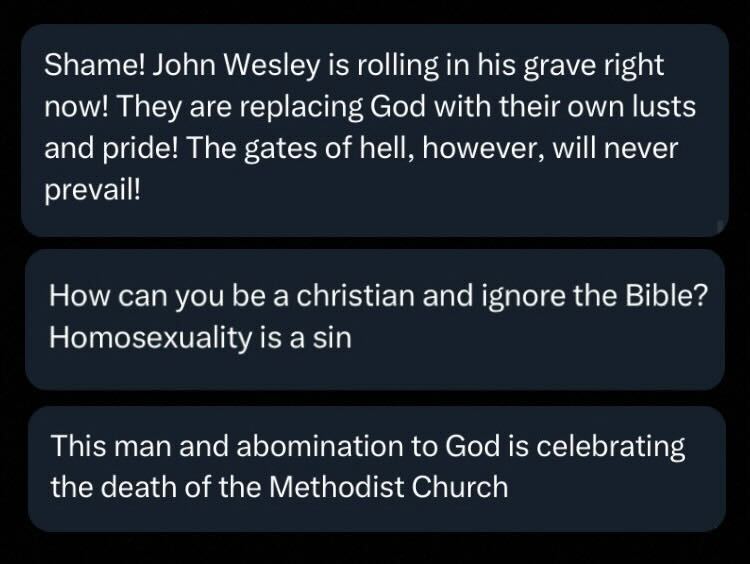
For years, I grew more and more battle-hardened, staying in the fight (and the church) for three reasons: my love for the faith, my love for queer people, and the notion that somebody had to clean up this mess. Eventually, I made the choice so many have: I left for my own sanity.
I know that for many people, this seems like the obvious choice. “If the church is homophobic, why don’t you just leave?” But when we buy into the false dichotomy of Religious vs. Queer (a dichotomy invented by homophobes, mind you), we force queer people to sever themselves from a crucial aspect of themselves, something that gives their life meaning, community, and hope. And I’ve watched too many people—people I love, people I miss—pick the former.
But now, thanks to this monumental decision brought about by the stubborn hopefulness of queer Methodists and their allies, fewer of my family will be forced to leave themselves behind. It’s a good day.
The Inside Woman at the Obama White House
Social secretary Deesha Dyer is sharing her real life behind the scenes—her imposter syndrome, her abortion, and what she wants young Black women to know.
BY REBECCA CARROLL
Back in 2009, as a 31-year-old part-time community college student inspired by the election of America’s first Black president, Deesha Dyer applied on a whim for a White House internship. Much to her astonishment, she got it. She went on to become the White House social secretary during the last two Obama years, curating large-scale events, meeting royalty, the Pope, and her hip-hop heroes. She managed her spectacular successes while fighting off a severe case of imposter syndrome and dealing with the daily microaggressions a Black woman faces in the historically whitest of houses. Dyer tells her extraordinary story in her new memoir, Undiplomatic: How My Attitude Created the Best Kind of Trouble, and we sat down to talk about all of it.
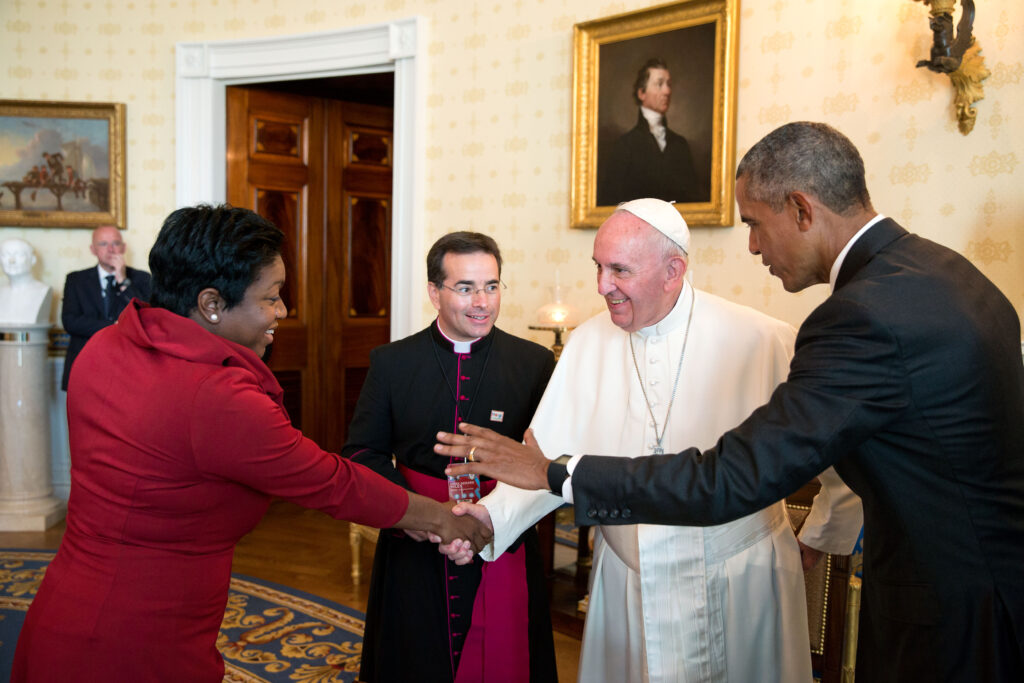
Rebecca Carroll: For many people, but especially for Black folks, the Obama years were not just an eight-year presidency; they were an era, like the Harlem Renaissance or the Black Arts Movement. It was a collective glory. What was it like to be such an integral part of that?
Deesha Dyer: What made it so wonderful for me is that I wasn't in this world before, so I had no preconceived notion. The same wonder I had when I started encountering [Barack Obama] on my television in 2007 was the same way I was for eight years.
Yes, they were President and First Lady, but also they were Barack and Michelle Obama—community activists, Black folks who had student loans at some point. It was an everyday tussle in my head of being like, “Remember, they're President and First Lady; they're not just Barack and Michelle.” I wanted to look at them as regular people, but I had a job to serve them. And they are people that I respect and revere. To this day, sometimes Barack Obama will joke with me, and in my head, I'm like, “Oh my God, I’m living this moment, I'm a witness to this,” and it's just a joy.
In your book you write that you identified with President Obama’s non-traditional family background. Can you talk a little bit about why that is?
Number one, we always saw white presidents—but also, when I got to know Barack Obama's background, it was just like, “He didn't have a mom and dad both in the home; he lived with his sister, and he lived in Hawaii. He moved around, so it wasn't like this cookie-cutter background.” [Dyer spent most of her childhood away from her parents while she attended a boarding school for low-income students.] And I had that excitement like, “He understands what some of us go through…This person will maybe get some things that are not traditional.”
One of the very real joys of your book is its realness and humor. When you write about your interview with Mrs. Obama for the job of social secretary, and she asks you how you’re doing—I mean, you were all of us when you said in your head: “I am out here fighting for my life!”
I’m fighting for my fucking life! Like, “What do you mean how am I? How would you be sitting here for an interview with Michelle Obama?! How would you be sitting with yourself? Clearly, I'm not okay.” I can see it like it was yesterday.
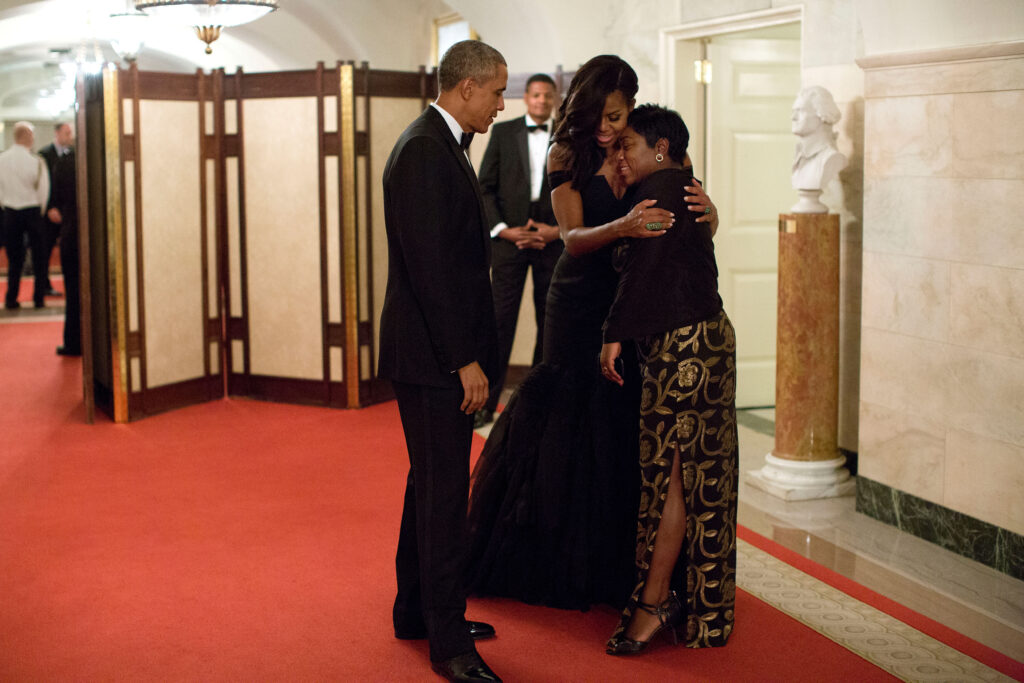
Were there other instances with Mrs. Obama that you left out of the book and might want to share?
Oh, there were millions. But [she] would always tell me to tell my story. One time, we were in Miami, and I was working, so I wasn't at the dinner table. She said, “Deesha, come over here, sit down, and tell them your story.” And I'm like, “Erm.” I knew her friends, but I held a very clear distinction: If I'm working, I ain't drinking. I'm over here. When y'all leave, that's when I'll eat and drink, right?
We had a lot of just small moments, fun moments, laughing moments. She's a human being, but she's also one of these people that—you prepare for a meeting with and think you’ve thought of everything, and she asks the one thing you didn't think of.
You write very candidly about having had two abortions, one while you were working at the White House—ironically, you wrote, just after you met the Pope. You say that that second abortion ended up being kind of a breakthrough in your life. Did that surprise you?
It really did, because I was still very thick in the imposter syndrome: “I'm a fraud, blah, blah, blah.” When I had the abortion, there were no regrets. I've always been on the side of reproductive rights. I had a medical abortion, so I did it at home. But I went back to work when I was still bleeding and wearing Depends. And I was just like, “What the literal fuck am I doing here with a fucking diaper on? This is crazy.” That breakthrough for me was huge because I just couldn't believe that I thought I had to go back to work wearing a diaper after an abortion.
Because if you didn't, it would further fuel your sense of fraudulence?
One hundred percent. The culture of work is different now than it was then, and I think I was afraid somebody would be like, “Why is she taking [time] off?” And so, I was like, “I'm going to go back just to prove I can do it.” Because when you're in your fraudulence, you do anything to prove that you can handle it. Which is why we see Black women in the workplace with hair loss, diabetes, high blood pressure, and strokes: because we're trying to prove that we're not a fraud, that we're supposed to be there, that we can handle it.
It's the way in which imposter syndrome is so symbiotic with the historical stereotypes that have been put upon us.
Say that! I know that we've come very far with mental health and workplace culture, but please. If a Black woman is like, “I'm going to take some time off,” when you come back, it’s like, “Are you okay?” Treating me like I'm a child. I never really [encountered] anybody who did that in the White House, but it still was the White House. It was still people [who did not believe] I could do the job. And so, I thank goodness something didn't happen to me because I would’ve probably died for that job. For what? Now, I'm like, “No.”
We were talking earlier about your abortion—how surreal is it now to think about having had an abortion while at the White House, which is two miles from the Supreme Court where Roe was overturned?
I'm not surprised, especially given the last President [and his] Supreme Court justice [appointees], but I would say I'm angry. I'm angry in a way that makes me have to watch my wellness. As somebody who's had abortions and somebody who has a fucking vagina and ovaries and everything else, it's kind of just like, “How are we so discounted that we can't make our own decisions?” It's the reason why I talk about [my abortion] in the book: I want people to understand that abortion is a normal thing. We have sex, and [if] we don't want to have children, we have abortions. Let's move on.
But did I think we would ever be here? I don't think I did. But when Trump came, I knew it was a possibility. I remember running to my OBGYN and getting my IUD because I knew what was going to happen. I got it in February 2017 before I lost my federal health insurance, and I was like, “Let me get the real good one, the one that will last through his presidency.”
By the way—and I don’t know if this is a spoiler or not—but I didn’t realize that the whole Melania Trump bringing a gift for Mrs. Obama on the “transition of presidential power” day was an act of defiance. Everybody saw Melania step out of the car holding a blue Tiffany’s box, and that it was immediately awkward when she handed it to Mrs. Obama, but you write that you had actually confirmed with Trump’s team that there wasn’t going to be a gift exchange.

Yeah, we confirmed that there were no gifts coming. Otherwise, we would've planned for me to be right there so she got it. But you could see on Mrs. Obama's face like, “Damn.” Legit like, “What's happening? What are we doing here?” I think that was [the moment] for me when I was like, “I'm done. This is it for me. These people have lost their everlasting fucking minds.” How do you come up here with a fucking Tiffany's box? Are we sponsored by Tiffany’s? But it was also so on-brand for them.
I understand what you mean by on-brand, but even so, why do you think [Melania Trump] would do that?
I'm going to be for real. I don’t think Mrs. Trump had a clue. I honestly think she had no idea about the protocol. I think she was shocked to be there. I think they were both shocked to be there for all four years. I think maybe they knew where the White House was, but that's about it. I don't think that they had any idea [about protocol], but their team should have known.
In keeping with our idea of fighting and wellness, your story includes a lot about your “unexpected path,” and I wondered how your definition of an expected path has changed since you worked in the White House.
My definition has changed in the sense that I don't have one anymore. But I think that the world's definition is still the same. There aren't a lot of companies that are going to hire somebody with great experience and no college degree [as the Obamas did with me].

Just to bring it full circle: Towards the end of the book, you write about an experience you had after the White House where you thought you had this new gig you’d applied for in the bag, but you didn’t get it. You were very hard on yourself about that, and I thought you could have been kinder.
The first thing I did [when I didn’t get the job] was go back to the comfortable place of, “You did that all wrong.” [That experience] did knock me down, but it didn't keep me down. Before, I would be like Eeyore; I would just wallow in it. But [this time], I was like, “Okay, let me wallow. All right, let's go get a drink.” I want to be real with people; I'm not going to pretend that I don't still have these [feelings of doubt] that come and go. But I know how to manage it better, and I think that I am more kind to myself.
But this also goes back to the whole notion that Black women are only recognized if we’re Beyoncé or Breonna Taylor— either a superwoman or a statistic. It's like, can we have some middle ground?
Can we just exist? And in any which way we want to? Sometimes we want to be a superhero, and then sometimes we're like, “No, I want to sit at home and watch movies all day.” For so long, I thought [that desire] was me being lazy or wrong. No, fuck that. Now I'm laying in this bed, child.

Rebecca Carroll is a writer, cultural critic, and podcast creator/host. Her writing has been published widely, and she is the author of several books, including her recent memoir, Surviving the White Gaze. Rebecca is Editor at Large for The Meteor.
What the Columbia Protests Teach Us
 April 23, 2024 Shalom, Meteor readers, Happy Passover to those who celebrate and a felicitous Tuesday evening to those who don’t. Religious fun fact for you! There probably wouldn't be a Passover were it not for two very smart and brave women: Jochebed and Miriam, mother and sister of Moses. They really don’t get enough credit for saving Moses’ life, ya know. In today’s newsletter, we take a look at the student-led protests across college campuses and find out what stay-at-home parents are really ✌️worth ✌️. Shannon Melero  WHAT'S GOING ONTents on campus: Over the last week, an increasing number of student groups on college campuses across the country have staged major protests calling attention to the ongoing attacks on Gaza and demanding the schools’ administrations divest from Israel. Students at Yale, NYU, MIT, and Columbia have been arrested; at Columbia, where over 100 students were arrested—some temporarily evicted from their dorms—faculty walked out, objecting to the fact that the university president had called the NYPD.  STUDENTS WITH THEIR TENTS AT THE COLUMBIA ENCAMPMENT (VIA GETTY IMAGES) A lecturer from the law school told the Guardian that the police presence felt “completely unnecessary” and that “this was by all accounts a non-violent protest.” Not all students (from various campuses) agree: One student from the University of Michigan told CBS, “It's scary, it's terrifying. The sign says, 'Long Live the Intifada' ... not a comfortable feeling.” But student organizers at Columbia released a statement saying, “We firmly reject any form of hate or bigotry and stand vigilant against non-students attempting to disrupt the solidarity being forged among students—Palestinian, Muslim, Arab, Jewish, Black, and pro-Palestinian classmates and colleagues who represent the full diversity of our country.” (It’s also worth noting that Columbia’s own Human Rights Institute released a statement confirming that the protests were non-violent.) If like the students at the Columbia encampment last night you find yourself marking Passover at a protest or at home with family or friends it is a unique time to be doing so, considering the holiday’s deep roots in the struggle for liberation and lessons on mercy to outcast peoples. One Passover tale involves flinging the door open and declaring “All who are hungry come and eat!”—poignant words in the face of Gazans’ forced starvation. As Rabbi Elliot Kula wrote in TIME, “Solidarity is not just a pretty word, but a powerful tool we need to leverage in this time.” AND:
 FOLLOW THE METEOR Thank you for reading The Meteor! Got this from a friend? Subscribe using their share code or sign up for your own copy, sent Tuesdays, Thursdays, and some Saturdays.
|
![]()
They Waved Her Underwear in Front of a Jury and Called Her a "Slut Puppy"
THEY WAVED HER UNDERWEAR IN FRONT OF A JURY AND CALLED HER A "SLUT PUPPY"
Now Brenda Andrew is on death row, and the Supreme Court could weigh in
BY NEDA TOLOUI-SEMNANI
The U.S. Supreme Court will decide this Friday if it will hear the case of Brenda Andrew, the only woman currently on death row in Oklahoma. The Andrew case is the second Oklahoma capital punishment case vying for the court’s attention this term, and it has potentially far-reaching ramifications—not just for the state, but for the rights of women and queer people everywhere.
The background on the case is this: Andrew, along with James Pavatt, her former partner, were found guilty of first-degree murder in the 2001 shooting death of Andrew’s estranged husband, Rob, but the jury rejected the state’s charge that Andrew would be a “continuing threat to society.” Nonetheless, both Andrew and Pavatt were sentenced to death. Throughout Andrew’s 2004 trial, her sexuality, her dress, her demeanor, and, ultimately, her behavior as a wife, mother, and Christian were dissected and condemned. In an amicus brief filed with the Supreme Court, a former federal judge, 17 law professors, and four domestic violence advocates argue that the Andrew case was rife with gender bias that unfairly prejudiced the jury against her.
“At a time when women’s rights generally are on the chopping block—also the rights of queer people and civil rights of minority communities—we’ve got a case that’s at the extreme end of what it means when we dehumanize these communities when we strip people of their humanity,” says Nathalie Greenfield, a lawyer with the non-profit firm Phillips Black, which filed the writ of certiorari to the Supreme Court on Andrew’s behalf. She argues that if the Supreme Court does not review the case, the justices would sanction using “assumptions, stereotypes, and tropes about people who dare to transgress perceived norms,” especially when it comes to gender, race, and identity.

The trial transcript, for example, reveals that witnesses were encouraged to describe Andrew’s appearance in detail, from her dresses (“very tight, very short, with a lot of cleavage,” said one) to her make-up choices (“gothic”), and also to say whether they thought those choices were appropriate. Prosecutors also waved Andrew’s underwear in front of the jury and called her a “slut puppy,” one of the last things members of the jury heard before they began to deliberate.
“There [were] just so many recorded instances of gendered evidence being presented every single day [of the Andrew trial],” says Greenfield. “And a lot of this was about her appearance and her extramarital affairs. The focus was on the fact that this was a woman who was transgressing gender norms by not being this chaste Christian wife.”
Oklahoma is a particularly deadly state: It has executed 124 people since 1976, when the U.S. lifted its moratorium on capital punishment. (Only Texas has killed more people.) Of these, just three were women—two of whom were prosecuted by district attorney Bob Macy, who is considered the second deadliest prosecutor in United States history. He’s responsible for 54 death sentences—more than any other prosecutor who was practicing law between 1980 and 2001. He resigned in 2001 after evidence of prosecutorial misconduct was found in 18 of those 54 cases, resulting in three exonerations.
However, his shadow still stretches over Oklahoma’s justice system—and Macy’s assistant district attorney and protege, Fern Smith, was a prosecutor in the Andrew case. According to transcripts, Smith repeatedly asked witnesses to describe Andrew’s dress, opine over Andrew’s behavior, and state whether or not Andrew was, in Smith’s words, a “good mother.”
This isn’t the first time a case Smith has prosecuted has been challenged. She has been repeatedly accused of failing to disclose exculpatory evidence—evidence that could be favorable to the defendant—and even of destroying evidence. In fact, she was accused of prosecutorial misconduct by name in the case of Richard Glossip, the other Oklahoma capital punishment case that will be in front of the U.S. Supreme Court this year.
At a time when women’s rights generally are on the chopping block—also the rights of queer people and civil rights of minority communities—we’ve got a case that’s at the extreme end of what it means when we dehumanize these communities when we strip people of their humanity.
The Supreme Court has already delayed deciding whether to hear Andrew’s case twice. Tomorrow, they could do one of three things: agree to hear it, decline to hear it, or “vacate and remand,” which means the Supreme Court could return her case to the appellate court to reconsider without hearing an oral argument.
Since Andrew was sentenced, she has been the sole woman on death row; consequently, she has served the majority of her sentence—more than 16 years—in solitary confinement. According to the United Nations, prolonged solitary confinement, or more than 15 days without meaningful human contact, is defined as torture.
In February 2020, Andrew was moved to the general population, where, according to her lawyers, she thrived. She got a job and joined a quilting circle. In January, two days after her attorneys filed the writ of certiorari with the Supreme Court, Andrew was returned to solitary. She wasn’t given a reason.
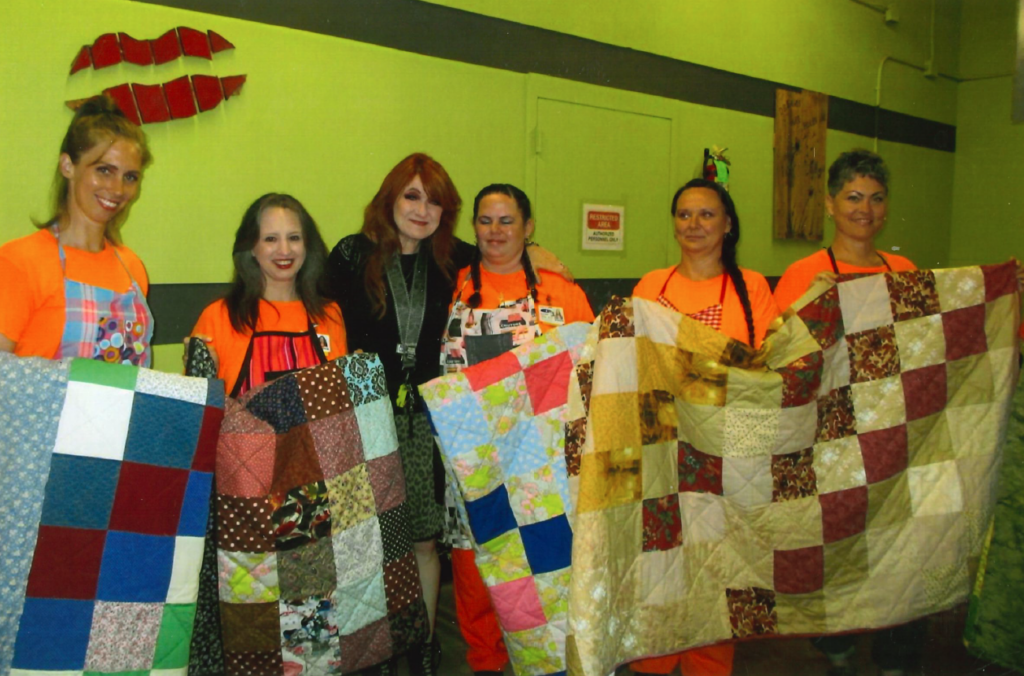
“The gender bias is just so finely woven into the trial that you can’t extricate it,” argues Jessica Sutton, another attorney with Phillips Black. “It’s unique in that way. However, the real issue implicates the due process clause of the 14th Amendment. We have to ensure that trials are fundamentally fair. We want to make sure that, for the ultimate punishment, we have a reliable trial, a reliable process, a reliable conviction, and sentencing. What the prosecution did is undermine every aspect of the entire trial.”

Neda Toloui-Semnani is an Emmy-winning journalist and the author of They Said They Wanted Revolution: A Memoir of My Parents.
SCOTUS Just Made Protesting Much Harder
|
Evening, Meteor readers, Before we get any further away from the afterglow of March Madness, I must congratulate our top bracketologist, Em, who is getting a brand-new Meteor tote. They had this to say about their unexpected victory when I contacted them with the news: In today’s newsletter, we dig into a ruling targeting protest organizers, talk more basketball, and share a warning about the importance of oxygen. Looking forward to the regular season, Shannon Melero  WHAT'S GOING ON Freedom of assembly? Not for everyone: If you’re a protest organizer in Mississippi, Texas, or Louisiana, your life got a lot more complicated last Friday after the Supreme Court declined to hear a lower court case out of Louisiana: Mckesson v. Doe. The case is super layered, so let’s break it down. The question at the heart of the case, which was first heard in the Fifth Circuit Court of Appeals, is whether or not a protest organizer can be held financially liable for the actions of an attendee who does something illegal. The organizer named in the suit is DeRay Mckesson, the famed blue-vest-wearing Black Lives Matter activist (and podcast host) who organized a protest outside a Baton Rouge police station in 2016. During the action, a police officer was struck by a rock thrown by an unknown person who was present. There is no evidence that Mckesson himself injured the police officer; the accusation is that he created an environment that allowed for the officer to be injured. In the eyes of the conservative Fifth Circuit, Mckesson is financially liable for the illegal actions of this unknown assailant. But the legal logic to justify that is…loose. Under a 1982 court ruling in the case of NAACP v. Claiborne Hardware, protest organizers can only be held liable if evidence finds that they incited illegal activity through speech or authorized illegal action by attendees. But adhering strictly to that ruling would have let Mckesson off the hook, so the Fifth Circuit—with six Trump appointees—went further by adding an extra (intentionally vague) rule to the list of ways organizers can be found liable. According to this court, “The First Amendment does not apply ‘where a defendant creates unreasonably dangerous conditions, and where his creation of those conditions causes a plaintiff to sustain injuries.’” Because Mckesson’s protest blocked access to a police station and a public highway (a very common tactic in direct actions), he created “unreasonably dangerous conditions” and is therefore liable. As one judge on the Fifth Circuit who wrote a dissenting opinion on the ruling noted, the decision would unfairly make organizers liable for “the unlawful acts of counter-protesters and agitators.” Without action from SCOTUS, the ruling won’t be overturned, and any future organizer in Texas, Mississippi, or Louisiana will face great financial risk for anything that happens at their protest. While this doesn’t all-out ban protesting, it certainly makes it much harder to organize. The move couldn’t come at a worse time. Protestors have taken to the streets over abortion rights, trans rights, and climate change over the last year, and just yesterday, protestors in California, Oregon, and New York blocked major roads to call for a ceasefire in Gaza. If you’re organizing a protest over any issue and want to know your rights, learn more here. AND:
 CLARK AND WNBA COMMISSIONER CATHY ENGELBERT (VIA GETTY IMAGES)
 FOLLOW THE METEOR Thank you for reading The Meteor! Got this from a friend?
|
![]()
Ye Olde Abortion Ban Hits Arizona
|
Greetings, Meteor readers, I’m in for Shannon today, so you’ll have to wait until next week for your sports (and the results of our March Madness bracket, which she very much wants to announce personally). Today, we’re talking about that Ye Olde Arizona abortion ban in the Grand Canyon state, what O.J. Simpon should be remembered for, and a few weekend reads. Fare thee well, Samhita Mukhopadhyay  WHAT'S GOING ONHistory lessons: On Tuesday, the Arizona Supreme Court revived a zombie law from 1864 that would ban nearly all abortions in the state. The law stipulates that “a person who provides, supplies or administers to a pregnant woman, or procures such woman to take any medicine, drugs or substance” for the purpose of abortion could be prosecuted unless the pregnant person’s life is at risk. The current Attorney General of Arizona, Kris Mayes, has courageously said she will not prosecute people under what she has called a “draconian” law. Meanwhile, former gubernatorial candidate/current Senate candidate/die-hard election denier/Trump superfan Kari Lake, who enthusiastically endorsed this law during her governor bid, appears to be trying to distance herself from it. (I wonder why?) In trying to make sense of the resurrection of a law written before slavery was abolished or women had the right to vote, we talked to our resident abortion storyteller, historian, and host of “The A Files,” Renee Bracey Sherman.  A PROTESTOR AT A WOMEN'S MARCH RALLY IN ARIZONA (PHOTO BY MARIO TAMA/GETTY IMAGES) The Meteor: What is something about Arizona law and its roots in the Civil War era that you feel the average person is not fully grasping? Renee Bracey Sherman: I think many people are upset because we can see how different society is today from how it was in 1864. Black people were not considered full humans. There were laws against interracial marriage. Most of us couldn’t own property—in fact, we were property in the eyes of the law. Anyone can look around and see that we should not be using this standard to regulate our society—let alone medical care—so it feels outrageous. But Arizona is not the only state like this. When Roe was overturned, several states automatically reverted to their abortion bans from the 1800s. That part isn’t new, and people live under those laws now. What feels surprising for Arizona is that unlike Michigan, which took the opportunity to repeal their outdated laws, or Wisconsin, which is currently challenging theirs, the Arizona State Supreme Court thought [the law] could be implemented now. It’s like they didn’t look outside and check the temperature of our nation. They ignored the clear message from the last few elections that people want access to abortion. You noted that by today's standards, the original law would technically ban second- and third-trimester abortions, but it's being used to ban abortion completely. How is it possible that the law isn't being interpreted as it was written but can still be revived today? Courts are made up of people who make decisions—sometimes bad ones. They don’t have to follow the historical accuracy of the law. Everything is based on their interpretation. Not to mention: language changes. Regina and I talk about these language changes on our podcast. What we consider an abortion today—the intentional termination of a pregnancy—and when [that abortion] is possible is because we now have the ability to detect a pregnancy earlier than we did 160 years ago. But back then, [abortion laws] generally referred to the ending of a pregnancy after “quickening,” or the moment when the pregnant person could feel the fetus move, which is during the second trimester. So, one could argue that the law should only be applied to later abortion, but again, it’s up to the Court’s interpretation. And that doesn’t help us because a ban on any aspect of abortion is a ban for all of us. This is why abortion should not be left up to the courts and must be decriminalized and available for everyone throughout pregnancy. What happens next for Arizonans? What can we do to fix all of this? The advocates on the ground are doing a lot right now. They have two weeks to challenge the State Supreme Court’s ruling before it goes into effect. Abortion funds and clinics are trying to care for as many patients as they can and figure out whether they would like to continue providing care in defiance of the State Supreme Court’s ruling. State legislators are looking to try to repeal the ban but so far have been unsuccessful. The Governor and Attorney General are looking at all of the options they have at their disposal. Advocates are currently gathering signatures for a statewide ballot measure protecting abortion in the state constitution, so we’ll see how that plays out over the summer and into November. And, of course, all of this is complicated by voter disenfranchisement, which Regina and I talk about in our podcast interview with LaTosha Brown. But at the end of the day, while these are important fixes, it’s not addressing the larger issue that abortion decisions and care should not be left up to the government, courts, or popular vote to decide. As we rebuild, we need to envision a way to protect abortion access for everyone that isn’t dependent on a few judges and their inability to understand historical context or society today.  O.J. SIMPSON IS SHOWN DURING TESTIMONY IN HIS CRIMINAL TRIAL FEBRUARY 9, 1995. (PHOTO BY LEE CELANO/WIREIMAGE) O.J. Simpson’s real legacy, as told by bell hooks: There is going to be a lot of ink spilled about the passing of football star O.J. Simpson, who was acquitted of killing his ex-wife Nicole Simpson and her friend Ron Goldman almost 30 years ago. Simpson’s low-speed car chase and subsequent trial was a cultural flashpoint: Would a black man accused of killing a white woman be able to win in our racist criminal justice system? This was the narrative invoked by legal mastermind Johnie Cochran to convince the nation that a man who had allegedly abused his wife was not her killer. But Black feminists didn’t fall for it: bell hooks said to Charlie Rose in a 1995 interview that she hadn’t watched the trial, but while America made it about race, at its core, Simpson’s trial was also about upholding the patriarchy. “Once this becomes entertainment, once the cameras focus on O.J. Simpson,” she said, “people will forget that at the heart of this is both male violence and male violence against women.” AND:
 WEEKEND READS 📚On babies: Women are having children later. What does it mean? (TIME) On throuples: Three literary stars found love together. And now they are having a baby. (New York) On feminist history: In light of O.J. Simpon’s death, writer Moira Donegal re-upped this must-read Andrea Dworkin essay on Nicole Simpson’s murder. (Evergreen Review)  FOLLOW THE METEOR Thank you for reading The Meteor! Got this from a friend?
|
![]()
"I'm Here As Long As I Can Be"
"I'M HERE AS LONG AS I CAN BE"
Texas abortion provider Ghazaleh Moayedi, D.O., provides care for her neighbors—but she has to leave the state to do it
By Susan Rinkunas
After Ghazaleh Moayedi graduated college, she got a job working on the administrative side of Whole Woman’s Health, an abortion clinic in Austin, Texas. She respected the providers who chose the work—many of whom had witnessed illegal abortions before Roe v. Wade—but also thought the patients deserved doctors who looked like them. “I didn’t have the language for it at the time,” she says “But I noticed these doctors, older white men, didn’t reflect the people that we were taking care of. I knew that we needed new doctors.”
So, she went to med school and became an OB/GYN and complex family planning specialist in Dallas in 2018. Less than two years later, Texas lawmakers enacted abortion bans, first during the height of the pandemic, and then via the 2021 bounty hunter law known as Senate Bill 8. A few months later, Roe fell, and now Moayedi travels to Kansas to provide abortions—often to other Texans. I talked to her about what she’s doing to care for people after they return home, and her message for people living in Democratic-led states who think they’re safe from abortion bans.
Susan Rinkunas: When did you start traveling to provide abortion care?
Ghazaleh Moayedi: I started traveling to Oklahoma in 2020 [after] Gov. Greg Abbott shut down abortion care in our state under the guise of COVID restrictions. Abortion doctors traveling is common—but never from a state like Texas to somewhere else. That is the novel piece over the last few years. It’s always a doctor who lives on one of the coasts traveling to a restrictive state. That was a moment where I was like, ‘Oh, crap. In order to take care of Texans, I’m gonna have to start traveling.’ I started working at a couple of clinics there, in addition to the clinics I was working at in Dallas, and did that until Oklahoma shut down—it was about a month or so before Dobbs. Now, I am traveling to Kansas and working in a clinic there.

You’ve said it’s surreal to be a Texan leaving the state to care for other Texans leaving the state. Are you commiserating with patients? Do they know you’re from Texas?
I usually ask people when I make small talk when I’m doing an ultrasound. Like, “Where are you coming in from?” And people usually say Texas, then I ask where. “Oh, where in Dallas? I’m from Dallas, too, that’s why I’m asking.” I can just see people’s faces change. When I say, “Did you eat at that place? That place is really good,” I can see the light coming from people. It’s a moment for us both. We’re like, “Yeah, this is bullshit. It’s totally bullshit that we’re both here.” I had a patient who was like, “I wish you could have just done my abortion in the closet at this restaurant that we both knew.”
During a fall trip to Kansas, two of my patients were on the same flight I took. I’ve still been really processing that in and of itself, that we’re all on this flight together, how just stupid, pointless, [and] inhumane this is.
Are there certain patients you can’t stop thinking about?
I’ve had patients whose partners have lost their jobs because of the time they have to take to come and travel. There’s a ripple effect of harm that happens from people needing to travel to get abortions.
When someone does a medication abortion [as Dr. Moayedi sometimes does for Texas patients in Kansas], there are rare cases where it doesn’t work. If I’m seeing them in Texas for an ultrasound afterward but there’s still a continuing pregnancy, it’s like, “Shit, you’ve gotta go out of state again.” I can’t do anything for them, and it’s unconscionable. Before [Dobbs], someone would show up a week after their medication abortion, and I could be like, “Yep, everything looks good” or, “Nope, it didn’t work. Okay, I can do an aspiration right now for you.” Now, it’s a never-ending saga.
In other states [like Kansas], it’s “take your medication abortion, and then in five weeks, take a pregnancy test.” Some of these people are waiting five weeks to be able to fully confirm that their abortion is complete. Not only did they have probably several weeks of waiting to get an appointment, get out of state, then do their pills, then come back—but now they’re going to have to wait another month to know that it’s complete. This is like a two-month minimum cycle in someone’s life of just trying to end this pregnancy.
I’m definitely seeing people making that calculation [about medication abortion] in their mind of, “Wait, then I have to wait to know that it’s done?” They’re so stressed out—they had to do all this travel—that they’re like, “I’m just gonna do a procedure [instead] so I can leave here knowing.” You take good care of them, but states are taking people’s autonomy away, and they’re being forced to make decisions out of this insulting process.
And you’re providing ultrasounds in Texas now?
After a Dallas abortion clinic closed in spring 2023, I started a little ultrasound practice so that, at least for folks in my general area, people don’t have to wait five weeks [to find out if their pills worked]. They can get an ultrasound with a trusted provider who isn’t going to judge them and who has deep experience in abortion care.
People really need a community-based provider that they can turn to when they come back [from an out-of-state abortion], someone that they can trust and talk to. It sucks not being able to provide abortions [in Texas]. But it is this whole new chapter of my work. It feels really good to still be able to take care of people in the ways that I legally can.
I mean, folks are going to crisis pregnancy centers for ultrasounds before and after abortions because they’re free. People are able to schedule appointments with me via Pegasus Health Justice Center. I have a cash rate that’s $250, but I’m working with abortion funds, and pretty much everyone is able to get funded.
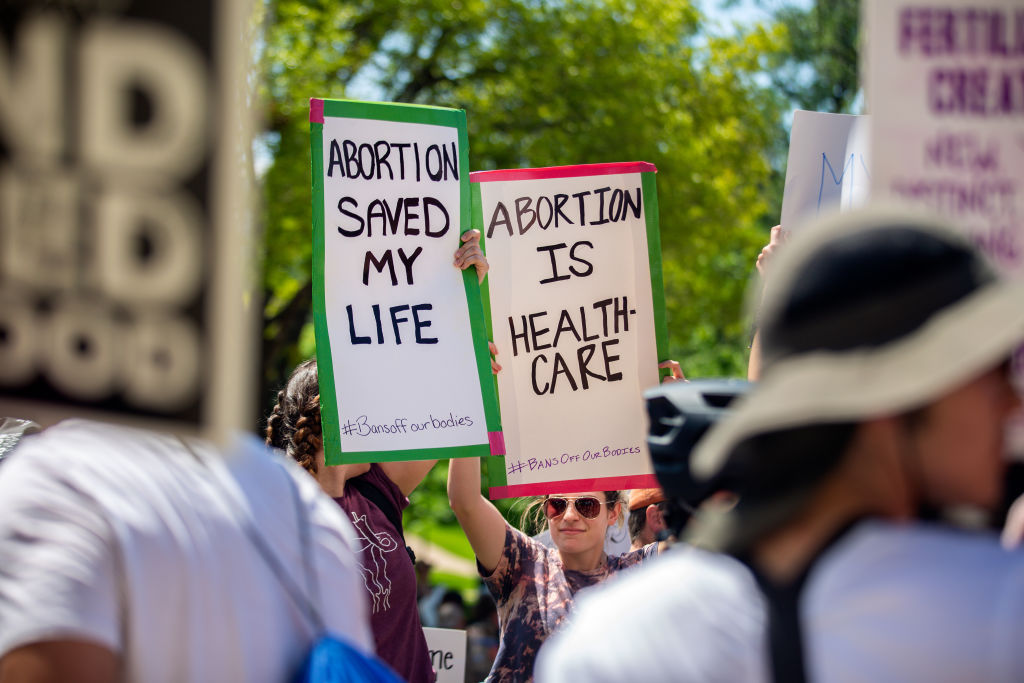
Have you thought about leaving Texas?
There isn’t such a thing as a safe state. We are one country, and these types of tactics are coming to every state. This mentality isn’t concentrated here [in Texas]. It exists in states without abortion restrictions as well. But people have this false belief that they are safe in these bubbles, and even within states like California and New York, the [anti-abortion] mentality exists. This extreme right, fascist, white-power movement exists everywhere, and abortion restrictions are an extension of that—they’re not separate from it.
After the Dobbs decision, I was feeling really low, even though we knew it was coming. It was like, “What the hell am I gonna do?” I considered moving and told my friends. I started looking at Zillow everywhere, like, “What’s New Jersey like? What’s Michigan like?” I interviewed for a few jobs in other states, and that was a couple of months of pouting and wondering what I was going to do. But I’m not going to escape from white supremacy anywhere in this country. I can move somewhere else and have a little bit more leeway in my work, but until when? We might have a president that is literally presidenting from jail.
Right, there could be a national abortion ban in January 2025.
Exactly. The reality is, I could pick up and move my whole family, and we could go somewhere “safe” for a period of time—and then what? I’m here as long as I can be. I think the idea that this is concentrated [in Texas] is really short-sighted. Everyone has a role to play in combating white supremacy and fascism within their own communities.
There’s a ripple effect of harm that happens from people needing to travel to get abortions.
What do you think of the talk online where people urge doctors to defy hospital orders and perform abortions in health emergencies?
It makes me incredibly annoyed and pissed off. That’s not how hospitals work. It’s not like I can just waltz into an operating room and say, “I am ready to do a surgery now.” Even when any hospital I worked at allowed it, there were still often multiple hoops I would have to jump through. Sometimes, even though it met all of the policy guidelines, there was someone who delayed the case because they needed to talk to someone who needed to talk to someone.
Doctors don’t own the hospital. We don’t actually direct anything in the hospital or schedule cases. There are multiple layers of people that have to approve things and even once it is approved, financially and policy-wise, you can still show up on that day and your anesthesiologist refuses, the nurse refuses, the tech refuses. I can’t do it alone in a hospital. I
could go to jail. I could lose my medical license, and then who am I going to help?
And rather than suggesting medical providers flout state laws, there are people organizing community networks for abortion pills, like Red State Access.
What pill networks are doing—that’s envisioning the future and being the future that we want and doing the work that needs to be done at the community level. That is how we change culture. That is how we address people’s needs in the moment, and we live out the future that we want. We’re saying we don’t need the courts to let us live the free lives that we can have. We actually have autonomy over ourselves.
That is, on all these micro levels and within communities, what people need to be doing: envisioning and living within the just future that we all deserve.



